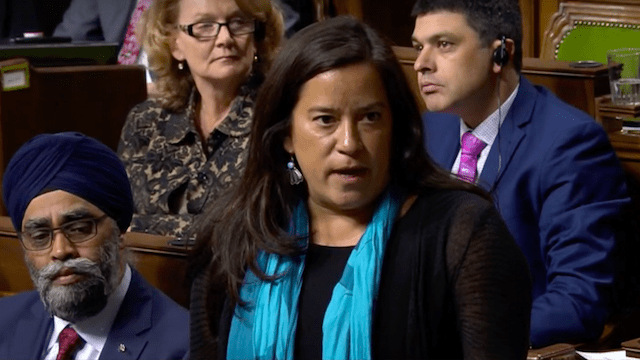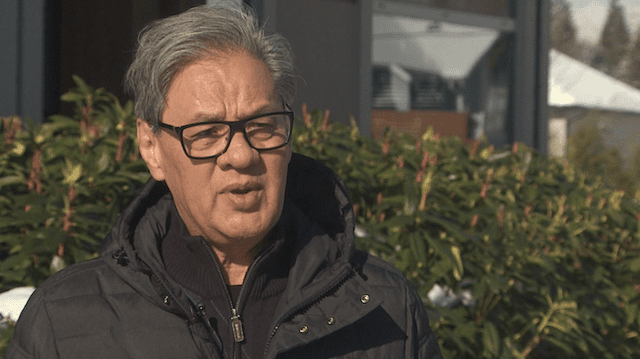
APTN News
When she speaks today, Jody Wilson-Raybould could answer some big questions on the minds of First Nation leaders.Privy Council Office (PCO) Clerk Michael Wernick’s Feb. 21 testimony to the House of Commons’ justice committee revealed there was tension between the former justice minister and attorney general and some of her cabinet colleagues, including Crown-Indigenous Relations Minister Carolyn Bennett, related to the proposed Indigenous rights framework.When Wilson-Raybould testifies before that same committee on Wednesday, it’s unclear whether she will address the framework differences, or if she will strictly address allegations she was pressed to intervene in the criminal prosecution of Montreal engineering and construction giant SNC-Lavalin.But as the controversy around the Prime Minister’s Office’s alleged misconduct continues to unfold, the future of Indigenous peoples’ rights, jurisdiction and title hang in the balance.In February 2018 Prime Minister Justin Trudeau announced the launch of an engagement process on his government’s Recognition and Implementation of Rights Framework, a suite of legislative and policy reform promised to “include new ways to recognize and implement Indigenous Rights,” Trudeau said in his Valentine’s Day speech in the House of Commons.Throughout most of 2018, Ottawa, led by Bennett, met with Indigenous leaders and select community members to gather feedback on what Nations and groups wanted to see in the framework.But by September, First Nation leaders were largely unsettled by the process, and by the contents of an overview document released by the government on Sept. 10, which purported to summarize the views of First Nations throughout the engagement process.On Sept. 11, at an Assembly of First Nations (AFN) special forum on the framework in Gatineau, Que., Bennett tried to quell fears the government was proceeding disingenuously with the work and perhaps with a goal of maintaining the status quo of rights denial with respect to Indigenous peoples in Canada.An AFN summary report of the event calls the government’s engagement process a “divide and conquer strategy” and accuses the feds of not being transparent about what it was hearing from First Nations.The report said the engagement sessions “fell short of full, fair and meaningful participation and were rushed.”On Sept. 13, the day after the AFN forum concluded, Wilson-Raybould gave a lecture at the University of Saskatchewan called “Recognition, Reconciliation and Indigenous People’s Disproportionate Interactions with the Criminal Justice System”.During her presentation she noted that, “[t]oo often we see the tendency — especially in politics — to use important words that have real meaning and importance, carelessly.“We see ‘recognition’ applied to ideas that actually mean ‘denial’. We see ‘self-government’ used to refer to ideas or processes that actually maintain control over others. We see ‘self-determination’ applied to actions that actually interfere with the work of Nations rebuilding their governments and communities. We see ‘inherent’ in the same breath as the contradictory idea that rights are contingent on the courts or agreements,” she continued.“When we see this being done it does not advance reconciliation. It actually undermines it. It causes confusion, chaos, and division.”According to Wernick’s testimony last week, Trudeau met with Wilson-Raybould, a driving force behind the framework, on Sept. 17, just days after the AFN forum and Wilson-Raybould’s Saskatoon speech.Wernick said he too attended the meeting, which was convened to discuss “very serious policy differences” between Wilson-Raybould, Bennett and other ministers over the framework.Wernick testified that “there were different views on a very significant thing,” and that Trudeau was growing “impatient” with the slow pace of work on the framework.“He was concerned we were losing momentum and traction heading into the last year of the mandate on the rights framework,” Wernick said, adding that he took over the framework file because Trudeau was consumed with the NAFTA negotiations with the United States.He said the issue was referred to the cabinet sub-committee on reconciliation, and then to cabinet.“There was a decision not to proceed with the rights and recognition framework.”In the two-plus months following that meeting, Wilson-Raybould delivered other speeches indicating she was unhappy with the government’s work on the framework.“The path of justice and equality is not advanced or achieved through half-measures, good intentions, or lofty rhetoric,” she said on Sept. 27 in Comox, B.C. during a speech on the criminal justice system and renewing Canada’s relationship with Indigenous Peoples.On Nov. 29, during a speech on Indigenous rights to First Nation and provincial leaders in Vancouver, she quoted late Squamish Chief Joe Mathias, who told the feds during constitutional talks in the early 1980s to “behold the turtle… who moves forward when he sticks his neck out.“I say, let us stick our necks out. I am,” she said.In a move that surprised many, on Jan. 14 Wilson-Raybould was removed as justice minister and attorney general and reappointed to lead the veterans affairs portfolio.She released a statement that day saying that “while our government has taken some very important steps, and hard work is being done” to recognize Indigenous rights and title, “the necessary shifts have not yet been fully achieved.”Kory Wilson, Wilson-Raybould’s sister, told APTN News this week that her sister called her hours before the cabinet shuffle announcement to give her family a head’s up.“Her priority was our mom, and making sure our mom was OK with it,” Wilson recalled. “Because she’s a lot more sensitive to what she hears on TV.“So [Wilson-Raybould] said, OK, you have to talk to mom and…tell her it’s going to be OK.“It is what it is, and this is politics.”Days after the Globe and Mail broke the story of alleged political interference on the PMO’s part toward the then-justice minister and attorney general, Wilson-Raybould resigned from cabinet.In her resignation letter she acknowledged that Canadians want to hear her side of the story, and that she had hired former Supreme Court Justice Thomas Albert Cromwell to advise her.She has said very little, publicly, since then, but has addressed her former cabinet colleagues and rose on a point of order in the House of Commons last week to say she was “anxious” to “speak my truth”.In a recent interview with APTN about the recent events, Grand Chief Edward John of the First Nations Summit in B.C. said he was concerned about the loss of Wilson-Raybould as a cabinet minister, and noted that the rights framework “is going nowhere fast.”He called the loss of Wilson-Raybould in cabinet “really disturbing,” explaining she had intimate knowledge of the challenges First Nations face when negotiating rights and title with Canada. Grand Chief Ed John of the First Nations Summit in B.C. says not having Wilson-Raybould in cabinet is a “tremendous loss to the country…” APTN Photo.“She’s a remarkable woman. She’s very well educated and understands these issues at a depth that very few people in the country, and certainly at the cabinet table, would have. So that in itself is a tremendous loss to the country, but a tremendous loss to us as well.”Wilson, who, like her sister is also a lawyer, said Wilson-Raybould’s removal as justice minister and attorney general, coupled with the removal of Jane Philpott from the Indigenous services portfolio, indicates “there has to be something we don’t know.“Why on Earth would you remove her….because there’s no one person in any ranking of government, MPs or the public service that knows more about this issue [of Indigenous rights] than she does, or of the paths forward than she does.”Asked on Tuesday what Bennett and Wilson-Raybould disagreed on with the rights framework, a spokesperson for Bennett’s office told APTN the minister had no comment.Wilson said her sister is dutiful to her role as a federal politician and doesn’t share internal information of this sort with others, including family.Though Wilson doesn’t know what her sister will say during her testimony on Wednesday, she said “[y]ou know for a fact what she’s going to tell is the truth, and likely everything she will say is well-documented.”Whether or not Wilson-Raybould will influence how the Indigenous rights framework unfolds, if the Liberals maintain power after the fall election, Wilson said her little sister has already made her mark for Indigenous people in Canada.“I think the fact that she was put as justice minister, the highest-ranking Indigenous person in cabinet, ever, even despite what has happened—there are a tremendous number of Indigenous youth out there that realize they can do this too.“Maybe this is what she has to go through to ensure that the doorway is open now for other Indigenous people to aspire…to be the change makers for Indigenous people wherever they are.”
Grand Chief Ed John of the First Nations Summit in B.C. says not having Wilson-Raybould in cabinet is a “tremendous loss to the country…” APTN Photo.“She’s a remarkable woman. She’s very well educated and understands these issues at a depth that very few people in the country, and certainly at the cabinet table, would have. So that in itself is a tremendous loss to the country, but a tremendous loss to us as well.”Wilson, who, like her sister is also a lawyer, said Wilson-Raybould’s removal as justice minister and attorney general, coupled with the removal of Jane Philpott from the Indigenous services portfolio, indicates “there has to be something we don’t know.“Why on Earth would you remove her….because there’s no one person in any ranking of government, MPs or the public service that knows more about this issue [of Indigenous rights] than she does, or of the paths forward than she does.”Asked on Tuesday what Bennett and Wilson-Raybould disagreed on with the rights framework, a spokesperson for Bennett’s office told APTN the minister had no comment.Wilson said her sister is dutiful to her role as a federal politician and doesn’t share internal information of this sort with others, including family.Though Wilson doesn’t know what her sister will say during her testimony on Wednesday, she said “[y]ou know for a fact what she’s going to tell is the truth, and likely everything she will say is well-documented.”Whether or not Wilson-Raybould will influence how the Indigenous rights framework unfolds, if the Liberals maintain power after the fall election, Wilson said her little sister has already made her mark for Indigenous people in Canada.“I think the fact that she was put as justice minister, the highest-ranking Indigenous person in cabinet, ever, even despite what has happened—there are a tremendous number of Indigenous youth out there that realize they can do this too.“Maybe this is what she has to go through to ensure that the doorway is open now for other Indigenous people to aspire…to be the change makers for Indigenous people wherever they are.”
-with files from Tina House










